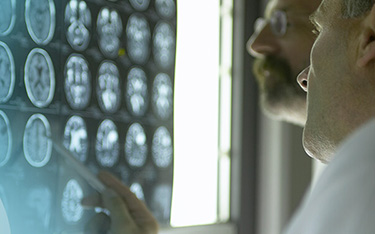Nuclear Medicine
Radioactive tracers scan the body to allow specialists to view organ function.
Nuclear medicine is the area of radiology that uses small amounts of low-level radioactive material to diagnose or treat diseases. These noninvasive and usually painless medical tests can help doctors diagnose many conditions, including cancers, injuries, and infections. They can also show the structure and function of internal body parts, such as bones, kidney, bowel, gallbladder, thyroid, and heart.
The type of test administered depends on each patient’s specific condition but may include positron emission tomography (PET) scans, computed tomography (CT) scans, magnetic resonance imaging (MRI), heart scans, or other advanced imaging technology.
Nuclear Medicine testing is used to locate an infection, analyze organ function, examine blood flow, evaluate a stroke, detect the presence or spread of cancer, measure thyroid function, localize lymph nodes before surgery, and scrutinize abnormalities in the brain.
Once our Nuclear Medicine specialists complete your testing, the images taken will be read by a radiologist who will provide your Kelsey-Seybold physician with a full report. With our advanced software technology and electronic medical records system, your care team can access your images and all your medical information, so they can collaborate on and coordinate your care and treatment.
Kelsey-Seybold's Nuclear Medicine team includes several members of our radiology department and cardiologists who are subspecialized in the performance and interpretation of cardiac studies.
Nuclear medicine testing is performed at four of our clinics (Berthelsen Main Campus, North Houston Campus, Tanglewood, and Fort Bend Campus) by a team of 40 certified technologists, so you can be seen quickly at one of these convenient locations. Dedicated to safety, our specialists and technologists ensure that our patients’ radiation exposure will be kept to the lowest levels possible while still providing accurate test results.


